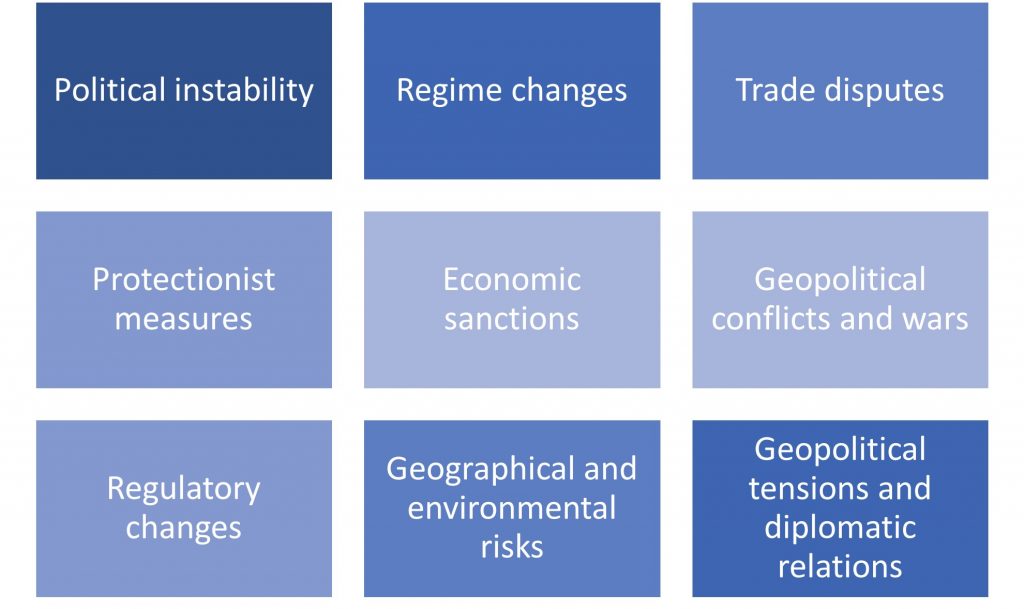From Pandemic to Politics: How Logistics are Being Reshaped in a Turbulent World
The global economy has been under tremendous pressure since the start of the COVID-19 pandemic and the war in Ukraine. These two crises have forced companies to find ways to be prepared for geopolitical tensions and supply chain disruptions.
Pandemic-induced disruptions
Since the beginning of the 2020s, the global economy has been under pressure from multiple complex and interconnected crises. First, the Covid-19 pandemic interrupted global value and supply chains, causing production halts, movement restrictions of people and goods, border closures, and logistical constraints such as labour shortages, port closures, and limited capacity in air and sea freight. Despite a slowdown in trade and business during the pandemic, e-commerce had a significant boost, and some industries, such as tissue and hygiene, experienced a surge in demand. Contrary to expectations, demand for container shipping grew during the pandemic, bouncing back quickly from an initial slowdown. These events, combined with a sustained surge in demand for shipping containers from East Asia and no slack capacity in container ships, sharply increased shipping costs.
War-induced disruptions
Europe’s logistics had not yet fully recovered from the pandemic when it was hit by the war in Ukraine. Several countries imposed sanctions on Russia, affecting its financial activities, trade, aircraft, and shipping spheres. The war in Ukraine continues to have an inflationary impact on the costs of raw materials, energy, and logistics. As oil and gas prices have increased globally due to high dependence on imports from Russia, actions to reduce this dependency have been taken. Increasing oil prices are also causing extra inflationary strain on transportation methods. At the same time, consumer confidence has been weakening under the weight of inflation, higher rates, and economic uncertainty, which limits investments and consumption.
Disrupting traditional supply chains
As Western ports were no longer accessible for Russia due to sanctions, the export routes from Europe to Asia had to shift to congested and expensive rail transport, resulting in a major shift in logistics value chains. Traditional supply chain routes have been disrupted, highlighting the demand for supply chain redesign and flexibility. The demand for rail freight increased during the pandemic when it became a logical alternative after restrictions were put in place. Shipping companies are now forced to find alternative freight routes.
How to manage geopolitical risks and their effect on supply chains
To manage geopolitical risks and their effect on supply chains, companies should identify geopolitical trends that may impact key supply locations and industries. They should also regularly evaluate risk exposure by mapping known supply chain nodes, assess each node’s vulnerability to disruption, and determine their ability to absorb or reduce the associated risks. Business strategy and operations should adapt to evolving geopolitical concerns.
To address these challenges, companies should focus on improving their supply chain resilience and agility. This can be achieved through a variety of measures, including investing in diversifying suppliers and supply chain routes, conducting comprehensive risk assessment, developing contingency plans, fostering strong relationships with suppliers, monitoring geopolitical developments and diversifying markets by exploring new markets and customer segments.
Other actions include, for example, investing in technology and data analytics, engaging in stakeholder engagement and advocacy, developing crisis management plan, and building flexibility and agility into the supply chain. By doing so, companies can reduce the risks associated with geopolitical tensions and supply chain disruptions, and ensure their operations remain competitive and profitable in a rapidly changing global economy.
Figure 2. Steps of geopolitical risk management.
In conclusion, the pandemic and war have caused significant disruptions to global logistics and supply chains. To weather these disruptions, companies must be prepared to adapt to changing geopolitical risks and implement flexible supply chain strategies.
With a deep understanding of the complex interdependencies and vulnerabilities that underpin global supply chains, Vision Hunters can help companies identify potential risks and vulnerabilities, assess their impact, and develop proactive strategies to mitigate them.
Vision Hunters provides strategic advisory services for the forest and bio-based industries, and energy sectors. We assist leadership teams in making the smartest strategic choices to improve the outcome of their company in the future. We are highly experienced and result-oriented and have advised many of the leading companies in our industry.

